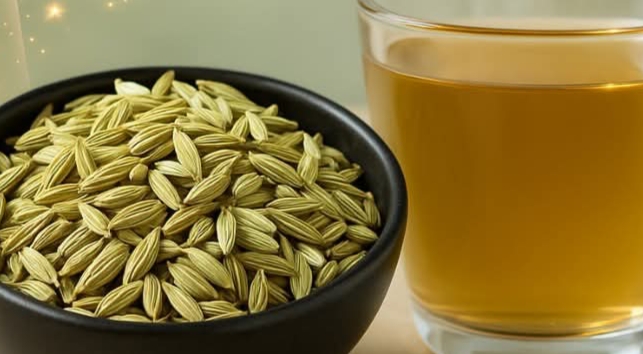What Are Fennel Seeds?Fennel seeds come from the fennel plant (Foeniculum vulgare), a flavorful herb in the carrot family. The seeds are small, greenish-brown, and taste mildly sweet—often compared to licorice or anise. In many cultures, especially in India and the Mediterranean, fennel seeds are used both as a spice and a post-meal digestive aid.They contain a variety of natural compounds like:Anethole – known for its anti-inflammatory propertiesFiber – helps with digestion and gut healthEssential oils – offer antimicrobial benefitsFennel seeds are easy to chew and can be taken in small amounts, making them a practical addition to your daily routine.How Fennel Seeds May Help with DigestionMany Americans experience occasional bloating, gas, or indigestion—especially after larger meals. Fennel seeds may gently support your digestive system in a few key ways.1. Eases Gas and BloatingResearch suggests that fennel seeds may help relax the gastrointestinal tract, which can reduce gas buildup and discomfort. A review published in the Journal of Gastroenterology and Hepatology found that fennel can relieve symptoms of functional dyspepsia (indigestion).2. Stimulates Digestive EnzymesChewing fennel seeds may help stimulate saliva and digestive juices, aiding in the breakdown of food. This can lead to more efficient digestion and less post-meal sluggishness.3. May Help With Mild ConstipationFennel seeds are a mild natural carminative—a substance that helps relieve flatulence and improve bowel movement. They also contain a bit of fiber, which supports gut regularity.How to Use for Digestion:Chew ½ to 1 teaspoon of whole fennel seeds after mealsAvoid swallowing large quantities or using fennel oil without medical adviceAnti-Inflammatory Potential of FennelInflammation is the body’s natural response to stress or injury. But when it becomes chronic—due to poor diet, stress, or lack of movement—it may contribute to fatigue, joint stiffness, and other health challenges.Fennel Seeds and InflammationFennel seeds are rich in antioxidants such as flavonoids, phenolic compounds, and anethole, which may help reduce oxidative stress in the body. Some studies suggest that these compounds could play a role in calming minor, non-specific inflammation.In a 2021 study published in Biomedicine & Pharmacotherapy, fennel extract showed anti-inflammatory effects in lab settings, though more research is needed to confirm how this translates to everyday use.Key anti-inflammatory benefits may include:Supporting joint comfortAssisting with oxidative stressProviding natural antioxidants from food sourcesNote: Fennel is not a substitute for medications prescribed for inflammatory conditions. Always consult your doctor.Who Should Consider Trying Fennel Seeds?Adding fennel seeds to your daily routine may be helpful if you:Experience occasional bloating, indigestion, or mild gasWant a natural, low-risk way to support digestionAre looking for gentle, food-based anti-inflammatory supportHowever, avoid fennel seeds if you:Have a known allergy to fennel or related plants (like celery or carrots)Are pregnant or breastfeeding without your doctor’s approvalTake medications that may interact with herbs (always check with your physician)Easy Ways to Incorporate Fennel Seeds into Your DayYou don’t have to overhaul your diet to enjoy the benefits of fennel. Here are some simple, everyday ways to include them:1. Chew After MealsTake a pinch (about ½ teaspoon) of raw fennel seeds and chew them after eating. This is the traditional method used in many cultures.2. Make Fennel TeaSteep 1 teaspoon of crushed fennel seeds in hot water for 5–10 minutesStrain and sip slowly after meals3. Add to CookingSprinkle ground or whole fennel seeds into soups, roasted vegetables, or rice dishes for a sweet, herbal twist.4. Mix with Other Digestive HerbsFennel blends well with other gentle herbs like peppermint or ginger for enhanced digestive comfort.What the Experts SayAccording to the National Center for Complementary and Integrative Health (NCCIH), fennel is “generally recognized as safe” when consumed in food-level amounts.The Cleveland Clinic notes that fennel may help with bloating and is often used as part of a natural approach to digestive discomfort.WebMD points out that fennel is traditionally used for digestion and mild respiratory symptoms, though research is still developing.While more large-scale human studies are needed, many experts agree that fennel can be a safe, food-based way to support your body—especially when used in moderation.The Bottom LineFennel seeds aren’t a cure-all, but chewing a small pinch after meals may offer real, gentle benefits for digestion and minor inflammation. It’s a time-tested habit with minimal risk and surprising upside—especially when paired with a balanced diet and healthy lifestyle.Try it for a week and see if you notice a difference in how your stomach feels after eating. Sometimes, the simplest habits really do make an impact.✅ Share this tip with a friend who loves natural remedies!📌 Looking for more gentle wellness strategies? Explore our health tips section for simple, science-backed ideas.*Disclaimer: This article is for informational purposes only and does not substitute professional medical advice. Consult your doctor before making health changes
This Everyday Spice Could Calm Inflammation – Just a Pinch May Surprise You
